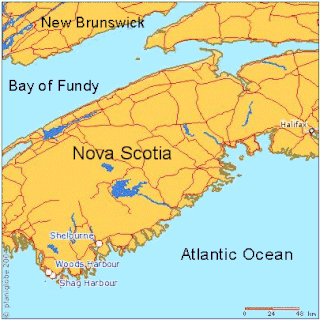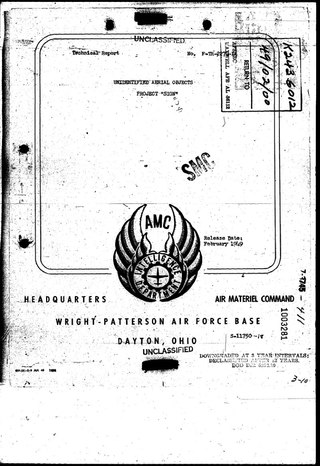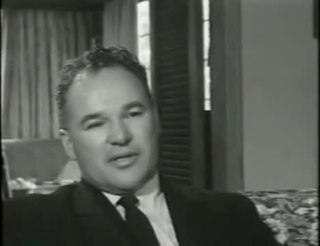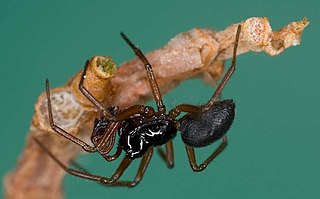
An unidentified flying object (UFO), or unidentified anomalous phenomenon (UAP), is any perceived airborne, submerged or transmedium phenomenon that cannot be immediately identified or explained. Upon investigation, most UFOs are identified as known objects or atmospheric phenomena, while a small number remain unexplained.
The term foo fighters was used by Allied aircraft pilots during World War II to describe various unidentified flying objects or mysterious aerial phenomena seen in the skies over both the European and Pacific theaters of operations.

The Cash–Landrum Incident was an unidentified flying object sighting in the United States in 1980, which witnesses claimed was responsible for causing health and property damage. Uncharacteristically for such UFO reports, this resulted in civil court proceedings, though the case ended in a dismissal.

The Shag Harbour UFO incident was the reported impact of an unknown large object into waters near Shag Harbour, Nova Scotia, a tiny fishing village on the Atlantic coast, on 4 October 1967. The reports were investigated by various Canadian civilian and military agencies as well as the U.S. Condon Committee.
The National Investigations Committee On Aerial Phenomena (NICAP) is an unidentified flying object (UFO) research group most active in the United States from the 1950s to the 1980s. It remains active primarily as an informational depository on the UFO phenomenon.

The Condon Committee was the informal name of the University of Colorado UFO Project, a group funded by the United States Air Force from 1966 to 1968 at the University of Colorado to study unidentified flying objects under the direction of physicist Edward Condon. The result of its work, formally titled Scientific Study of Unidentified Flying Objects, and known as the Condon Report, appeared in 1968.

Project Sign or Project Saucer was an official U.S. government study of unidentified flying objects (UFOs) undertaken by the United States Air Force (USAF) and active for most of 1948. It was the precursor to Project Grudge.

The Mariana UFO incident occurred in August, 1950 in Great Falls, Montana. The sighting, filmed by local baseball coach Nick Mariana, is believed to be among the first ever motion picture footage of what came to be called an unidentified flying object (UFO). The U.S. Air Force, after a short investigation, concluded that what Mariana had actually filmed were the reflections of two F-94 jet fighters, a claim that the Air Force would later retract.
Identifying unidentified flying objects (UFOs) is a difficult task due to the normally poor quality of the evidence provided by those who report sighting the unknown object. Observations and subsequent reporting are often made by those untrained in astronomy, atmospheric phenomena, aeronautics, physics, and perception. Nevertheless, most officially investigated UFO sightings, such as from the U.S. Air Force's Project Blue Book, have been identified as being due to honest misidentifications of natural phenomena, aircraft, or other prosaic explanations. In early U.S. Air Force attempts to explain UFO sightings, unexplained sightings routinely numbered over one in five reports. However, in early 1953, right after the CIA's Robertson Panel, percentages of unexplained sightings dropped precipitously, usually being only a few percent in any given year. When Project Blue Book closed down in 1970, only 6% of all cases were classified as being truly unidentified.
The Chiles-Whitted UFO encounter occurred at approximately 2:45 AM on July 24, 1948, in the skies near Montgomery, Alabama, United States. Two commercial pilots, Clarence S. Chiles and John B. Whitted, claimed to have observed a "glowing object" pass by their plane before it appeared to pull up into a cloud and travel out of sight.

Project Condign was a secret unidentified flying object (UFO) study undertaken by the British Government's Defence Intelligence Staff (DIS) between 1997 and 2000.

Ballooning, sometimes called kiting, is a process by which spiders, and some other small invertebrates, move through the air by releasing one or more gossamer threads to catch the wind, causing them to become airborne at the mercy of air currents and electric fields. A 2018 study concluded that electric fields provide enough force to lift spiders in the air, and possibly elicit ballooning behavior. This is primarily used by spiderlings to disperse; however, larger individuals have been observed doing so as well. The spider climbs to a high point and takes a stance with its abdomen to the sky, releasing fine silk threads from its spinneret until it becomes aloft. Journeys achieved vary from a few metres to hundreds of kilometres. Even atmospheric samples collected from balloons at five kilometres altitude and ships mid-ocean have reported spider landings. Ballooning can be dangerous.
This is a list of alleged sightings of unidentified flying objects or UFOs in Brazil.
This is a list of alleged sightings of unidentified flying objects or UFOs in Italy.
This is a list of alleged sightings of unidentified flying objects or UFOs in France.

From July 12 to 29, 1952, a series of unidentified flying object (UFO) sightings were reported in Washington, D.C., and later became known as the Washington flap, the Washington National Airport Sightings, or the Invasion of Washington. The most publicized sightings took place on consecutive weekends, July 19–20 and July 26–27. UFO historian Curtis Peebles called the incident "the climax of the 1952 (UFO) flap"—"Never before or after did Project Blue Book and the Air Force undergo such a tidal wave of (UFO) reports."

The McMinnville UFO photographs were taken on a farm near McMinnville, Oregon, United States, in 1950. The photos were reprinted in Life magazine and in newspapers across the nation, and are often considered to be among the most famous ever taken of a UFO. UFO skeptics have concluded that the photos are a hoax, but many ufologists continue to argue that the photos are genuine, and show an unidentified object in the sky.
The Gorman dogfight was a widely publicized UFO incident which took place on 1 October 1948, in the skies over Fargo, North Dakota, United States. United States Air Force (USAF) Captain Edward J. Ruppelt wrote in his bestselling and influential The Report on Unidentified Flying Objects that the "dogfight" was one of three "classic" UFO incidents in 1948 that "proved to [Air Force] intelligence specialists that UFOs were real," along with the Chiles-Whitted UFO encounter and the Mantell UFO incident. In 1949, the official explanation made by the USAF was that the Gorman dogfight had been caused by a lighted weather balloon.

A spider web, spiderweb, spider's web, or cobweb is a structure created by a spider out of proteinaceous spider silk extruded from its spinnerets, generally meant to catch its prey.

Erigone atra is a species of dwarf spider or money spider, in the family Linyphiidae. It is commonly found in North America, Europe, parts of Russia, Central Asia, China, Mongolia, Korea, and Japan. This spider is one of the most common Erigone spiders. E. atra is an important spider for agriculture, as it preys on pests such as aphids which are commonly found on crops. E. atra spiders are aeronautical spiders, as they travel via ballooning. This technique, sometimes referred to as kiting, allows E. atra spiders to traverse large distances and find new habitats when environmental or human stresses create unfit living environments. E. atra is difficult to differentiate from other congeneric species because of their similar sizes and coloring.












